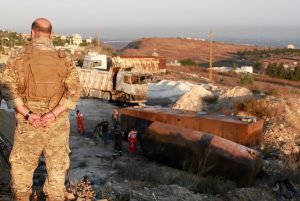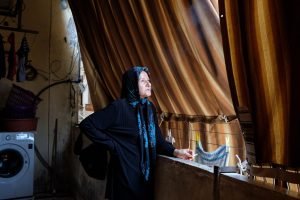A devastating fuel tanker explosion in the northern village of Tliel in Lebanon has furthered the political and economic crisis that the country is facing. The blast killed 33 people and left nearly 80 wounded. Lebanon has been called a failed state as the country and has witnessed the worst financial crisis since the 1975-90 war. United Nations reports say that up to 78 percent of the Lebanese population was living in poverty as of March, 2021.
A major part of the economic crisis stems from a fuel crisis within the country. People in major cities like Tripoli and Beirut stand in long lines for hours to procure fuel. Often, these crowds get unruly, leading to brawls and skirmishes. Police forces are forced to fire shots in the air to disperse crowds, as petrol stations are barricaded. Desperation led to violence in Tripoli where two men died on 2nd August, 2021 following a dispute over fuel. A grenade was lobbed too. Another man succumbed to wounds incurred during a fight at a petrol station in Bakhaoun. Some witnesses say that the blast in Tliel was a consequence of a fight. Around 200 people had gathered next to the fuel tanker, which broke into a heated brawl, which led to gunshots being fired and causing the blast. Tension and anger amongst citizens in Lebanon rages as they complete nearly two years in an economic crisis and ongoing political paralysis.

THE ECONOMIC SITUATION
Lebanon’s situation is the result of a series of ineffective policies. The Central Bank’s fuel subsidies have backfired and led to devaluation of the currency. The Bank supplies dollars to licensed companies to import petrol at the official pegged rate of 1,500 Lebanese pounds to the US dollar. The market rate is over 20,000 Lebanese pounds to the US dollar. This has led to a major fall in the value of the currency further causing hyperinflation in the market.

People struggle to get electricity as power cuts worsen across the country. Many people have resorted to buying diesel from private generators in the black market. Many have been blaming the distributors for selling fuel to Syria for greater profits. Distributors blame the Central Bank for not opening lines of credit. This vicious cycle of shifting burdens tramples the common man.
THE POLITICAL SITUATION
The economic crisis is made worse by the existence of a political power vacuum as the country has not had a fully-fledged government for over a year. After the Beirut port explosion last year, protests across Lebanon forced the government to resign. This attempt at strengthening democracy led to dire consequences. Ideological differences within the caretaker government led to the country plunging into a crisis without an elected government. The President, Michel Aon was a supporter of the Shite militant group Hezbollah and Prime Minister Saad al-Hariri was a Sunni Centrist. The Prime Minister publicly called out the President’s ties with Hezbollah, leading the World Bank and International Monetary Fund to shy away from injecting funds into the economy when the economy needed it.
Hariri resigned last month and powers were transferred to Najib Mikati. The President appointed Mikati, which has led to a lessening of infighting within the government. With Cabinet support, Mikati plans on calming the concerns of the international community with the help of other countries like France. Diplomats within the nation are concerned about the conditions of political and social reforms that would be imposed by the IMF. Another concern that lurks is the Hezbollah support behind Mikati’s appointment. It would be upon him to prove his skills in navigating through the interests of a terrorist organization.

LIFE IN LEBANON
With over half of the population slumping below the poverty line, the average Lebanese person struggles to make ends meet. The price of a loaf of bread was hiked to 4000 Lebanese pounds per loaf. The average Lebanese family needs to spend 5 times the mandated minimum wage to afford basic food requirements. Most people can not afford medicine, gas or electricity. Hospitals turn back patients and struggle to cater to the existing patients as they lack resources, fuel and staff. Even hospitals dealing with the Covid-19 outbreak can not afford gas and electricity. Means of transportation across the country plummet which has enraged businessmen across the country.
A mix of social outrage, inefficient governance and failed economic policies continue to hit the lowest sections of the society while even those in power make seemingly futile efforts to bring the country out from the fallen crisis.
